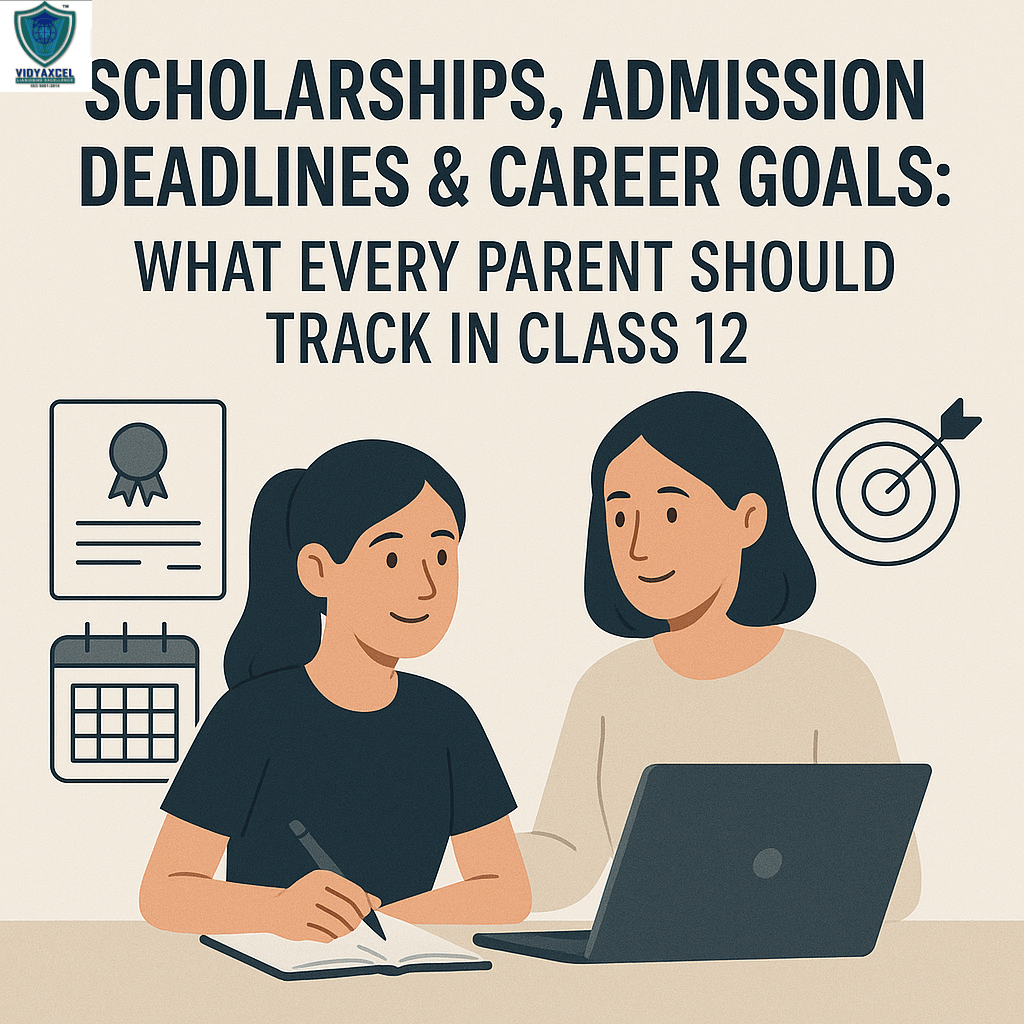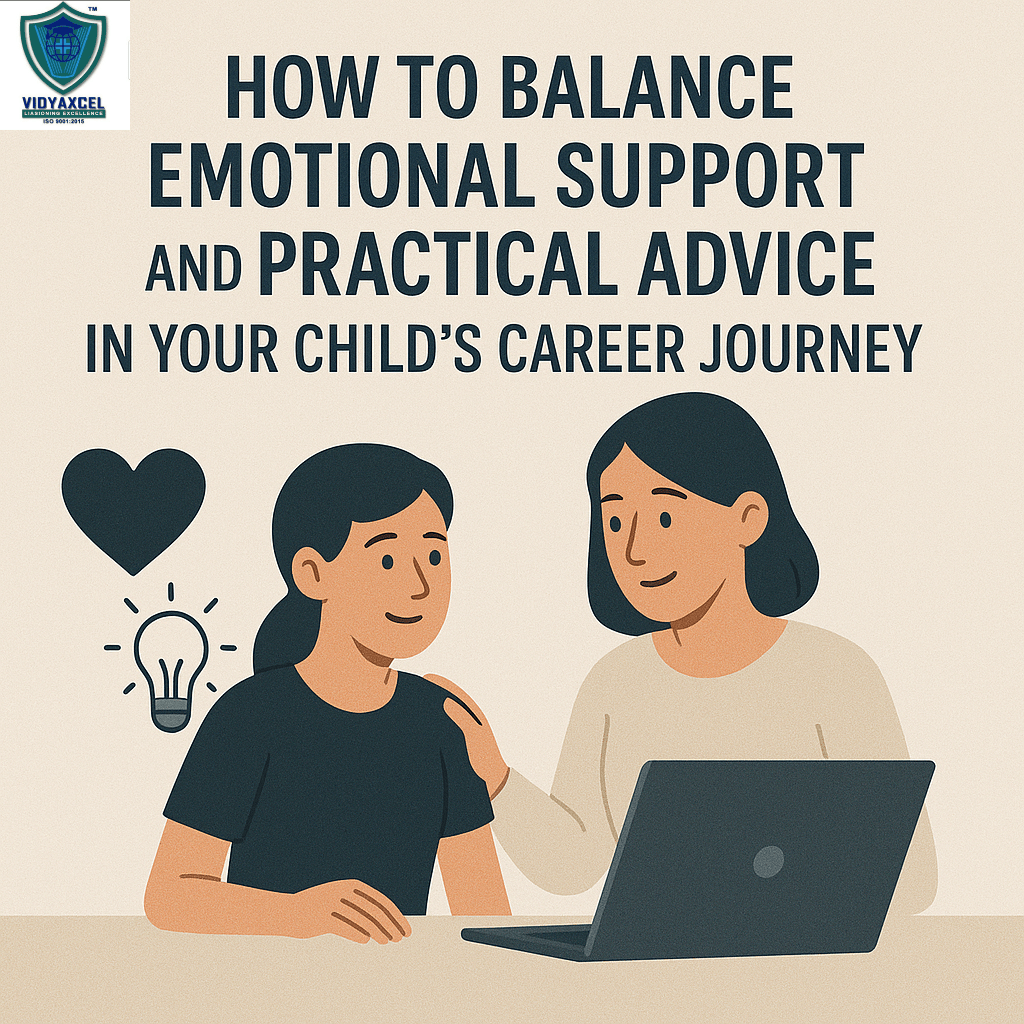Blog Details

02Aug
Scholarships, Admission Deadlines & Career Goals: What Every Parent Should Track in Class 12
For every student, Class 12 is a defining chapter—academically, emotionally, and professionally. It’s the last year of school and the launchpad for higher education and career pathways. But while students are busy with board exams, entrance prep, and internal assessments, parents often find themselves confused—unsure of deadlines, scholarship options, and career planning steps. This blog is a complete guide for parents to proactively support their child’s transition from school to college with clarity. From college application calendars to scholarship opportunities and career goal-setting, we’ll help you track what truly matters in this crucial year.
1. Class 12 as the Decision Year
Class 12 isn’t just about exam results. It’s about:
-
Shortlisting career streams
-
Applying to universities (India & abroad)
-
Preparing for entrance exams
-
Building non-academic portfolios
-
Applying for scholarships or financial aid
The problem? Everything happens simultaneously. So, the earlier parents and students prepare, the smoother the journey.
2. Major Milestones Parents Must Track
Here’s what every parent should have on their radar during the Class 12 academic year:
| Month | Key Milestone |
|---|---|
| April – July | Career planning, skill development, shortlisting courses |
| August – October | College research, entrance exam prep, SOP drafts |
| November – January | University applications, scholarship deadlines |
| February – March | Board exams, finalizing backup options |
| April – July (Next Year) | Entrance exams, counselling, college admissions |
3. Career Goals: Helping Your Child Choose Wisely
🎯 a. Understand Your Child’s Strengths and Interests
Encourage them to take:
-
Psychometric tests
-
Aptitude assessments
-
Career counselling sessions
🔍 b. Explore Career Clusters
Rather than fixating on a single profession, explore career clusters:
-
STEM (Engineering, AI, Research)
-
Business (Finance, Marketing, Entrepreneurship)
-
Creative Arts (Design, Film, Writing)
-
Healthcare (Medicine, Pharma, Psychology)
-
Social Sciences (Law, Public Policy, Education)
📚 c. Consider Professional vs. General Courses
-
Professional: Engineering, Law, Medicine
-
General: BA, BCom, BSc (ideal for students still exploring)
🧭 d. Stay Open to New-Age Careers
-
UX/UI design, Sports Analytics, Climate Studies, Data Journalism, Food Science
🤝 Parental Role:
-
Guide, don’t push. Suggest, but let them choose.
-
Arrange exposure—mentors, career fairs, industry webinars.
4. Admission Deadlines – Don’t Miss These!
📍 Indian Universities
-
CUET UG (Common University Entrance Test)
-
Reg. Starts: Feb–Mar | Exam: May
-
-
JEE (Engineering) / NEET (Medical)
-
Reg.: Nov–Dec | Exam: Apr–May
-
-
CLAT (Law): Reg. from July | Exam in Dec
-
NIFT / NID / UCEED: Design entrance exams
-
Private University Admissions (Ashoka, Shiv Nadar, Symbiosis)
-
Rolling admissions from Oct–Apr
-
Some have profile-based early admissions
-
🌍 International Applications
-
US/Canada: Common App & Coalition App
-
Early Action: Oct–Nov | Regular: Jan
-
-
UK (UCAS): Deadline – Jan 25 for most undergrad courses
-
Australia/NZ: Feb and July intakes
-
Europe: Country-specific (Germany via Uni-Assist, Netherlands via Studielink)
📝 Application Materials:
-
Academic transcripts
-
Statement of Purpose (SOP)
-
Letters of Recommendation (LoRs)
-
Extracurricular portfolio
-
Entrance test scores (SAT, IELTS, etc.)
🔔 Pro Tip for Parents:
-
Create a shared spreadsheet for:
-
Course names
-
University names
-
Application links
-
Deadline reminders
-
Fee structures
-
5. Scholarships Every Parent Should Track
📖 a. Need-Based Scholarships
-
NSP (National Scholarship Portal): Central Govt. schemes
-
State Govt. Scholarships: E.g., Kanyashree (WB), Yuva Swavalamban (Gujarat)
-
Inspire Scholarship (DST): For science stream students with top board marks
🌍 b. International Scholarships
-
UG Program Scholarships:
-
UK: Chevening, GREAT scholarships
-
US: Need-based financial aid by top colleges (Harvard, MIT)
-
Australia: UWA Global Excellence, Macquarie University India Scholarship
-
Germany/France/Netherlands: Country-specific fee waivers, DAAD (Germany)
-
🧑🎓 c. Merit-Based Scholarships
-
KVPY (Now integrated into IISER admissions)
-
Jindal Scholarship, Reliance Foundation UG scholarships
-
Aditya Birla & Tata Trust Scholarships
📝 Documents Needed:
-
Income certificates
-
Academic records
-
ID proof
-
SOP/Essays (in some cases)
-
Bank details
🎓 Additional Support:
-
Vidya Lakshmi Portal – Educational loans
-
Buddy4Study, ScholarshipOwl, WeMakeScholars – Scholarship search tools
6. How Parents Can Prepare Financially for College
💰 a. Estimate Total Cost
Include:
-
Tuition fees
-
Hostel/living expenses
-
Travel/relocation
-
Course materials & devices
📊 b. Plan for Different Scenarios
-
Public university vs private
-
India vs abroad
-
With scholarship vs without
🏦 c. Explore Education Loan Options
-
Banks like SBI, HDFC, ICICI
-
Collateral vs non-collateral loans
-
Moratorium period awareness
🤝 Pro Tip:
Involve your child in budgeting to teach them financial responsibility.
7. Non-Academic Portfolios: What Colleges Look For
Most universities today assess students beyond marks. What helps:
-
Internships (online or offline)
-
Volunteering/community work
-
Personal projects (e.g., blogs, YouTube channels, coding portfolios)
-
Olympiads, MUNs, creative writing
-
Sports and arts achievements
Encourage students to document and reflect on these in a resume or digital portfolio.
8. Supporting Mental & Emotional Well-being
🤯 Why It Matters:
-
Class 12 students face academic stress + identity exploration + uncertainty.
-
Many parents unintentionally add pressure by micromanaging or comparing.
🧘 What Helps:
-
Regular open conversations
-
Breaks & hobbies are essential
-
Normalize failure & reattempts
-
Seek counsellor help if needed
Let your child know they are valued beyond grades.
9. Action Plan for Class 12 Parents (Month-by-Month)
| Month | Parent Tasks |
|---|---|
| April–June | Career assessments, shortlist courses & countries |
| July–Aug | Collect documents, research scholarships |
| Sep–Oct | Help draft SOPs, get LoRs, track applications |
| Nov–Dec | Finalize college list, apply early (if possible) |
| Jan–Mar | Board prep support, stay positive, apply for financial aid |
| Apr–July | Entrance test support, counselling, make admission decisions |
10. Final Checklist for Parents Before Class 12 Ends
✅ Is the career goal aligned with your child’s interest?
✅ Have you tracked key application and exam deadlines?
✅ Are you financially prepared with or without a scholarship?
✅ Have you explored at least 1–2 scholarship opportunities?
✅ Is your child’s non-academic portfolio in place?
✅ Have you spoken openly about all possible outcomes?
Remember: College admission is a journey, not a one-time event.
Conclusion
As a parent, your job isn’t to steer the ship—but to be the anchor. Offer guidance, provide stability, but let your child own their journey. Tracking deadlines and scholarships is important, but so is respecting their pace, dreams, and individuality. With the right mix of structure, support, and freedom, Class 12 can be a year of empowerment—not pressure.
FAQs
1. What if my child is still unsure about their career even in Class 12?
That’s normal. Use this year to:
-
Take career assessments
-
Explore multiple fields
-
Attend webinars, workshops
-
Consider gap year or general degree with flexibility
2. Are scholarships only available to toppers or underprivileged students?
No. There are scholarships for:
-
Average performers
-
Specific communities (girls, minorities)
-
Sports, arts, social work
-
Niche subjects (design, languages)
3. How do I track so many admission and scholarship deadlines?
-
Use Google Sheets or Trello
-
Set up Google Alerts
-
Follow official university pages & scholarship sites
-
Subscribe to education counselling platforms (like Vidyaxcel, WeMakeScholars)
4. Is CUET mandatory for all central universities?
Yes, for most UG courses in 45+ central universities like DU, BHU, JNU, etc. Some private universities still conduct independent assessments or offer direct admission.
5. Can we apply to both Indian and foreign universities simultaneously?
Absolutely. Many students apply in parallel, but require different sets of documents. Start foreign applications early (July–October), and Indian ones post-board results.
Our Office: West Bengal, Maharashtra & Delhi.
For More Infomation about admission in Medical, Engineering, Management & Study in Overseas Details.
View Current Study Overseas, Medical, Engineering & Management Admission Details Video.




